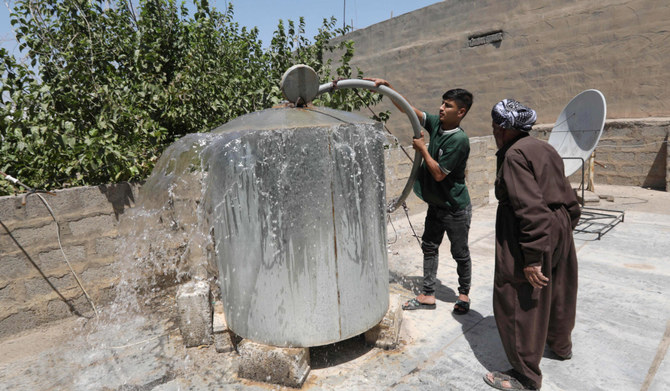IRBIL, Iraq: The taps have run dry, and the wells are almost empty. In the capital of Iraq’s autonomous Kurdistan region, 80-year-old Babir hasn’t bathed in weeks and impatiently waits for trucked-in water deliveries.
“There is nothing worse than not having water,” said Babir, who gave only his first name, in his modest house in Irbil’s Darto suburb.
As in several other densely populated areas of Irbil and its suburbs, Babir and his neighbors rely on groundwater as their primary water source.
But for years, they have dreaded summer, when relentless drought, a lack of wells and power outages that bring pumps to a halt leave them cut off the supply of water.
For everything from bathing to watering plants, cooking and washing, they have been forced to depend on trucked-in water.
Usually “we bathe once every fortnight,” said Babir, dressed in traditional Kurdish sarwal trousers.
From the roof of his house, he shouted for a water truck as it drove up into the street, then hurried downstairs to request a refill for his home.
This time, the truck belonged to a local aid group. When such assistance is unavailable, the retiree has to pay from his meagre pension or rely on family for water and other essentials.
Over the years, residents of several districts have taken to the streets many times to demand solutions, but Babir said appeals to officials had fallen on deaf ears. He said he was considering moving “to a place with water.”
Iraq is known in Arabic as the Land of the Two Rivers, referring to the once mighty Tigris and Euphrates. But the rivers’ water levels have plummeted and the UN classifies the country as one of the most impacted by some effects of climate change.
Authorities blame the drought as well as dams built upstream in neighboring Turkiye and Iran.
Irbil relies on 1,240 wells dotted across the city alongside the Ifraz water station that draws from the upper Zab River, which has its source in Turkiye and joins the Tigris in Iraq.
Its governor, Omed Khoshnaw, told reporters earlier this month that “more than 25 percent of wells have dried up this year,” adding that Irbil should rely less on groundwater.
Amid the crisis, the city’s local authorities say they have allocated 1.5 billion Iraqi dinars ($1.1 million) to help solve it, including by digging new wells and providing power via generators and the electricity grid.
Local official Nabz Abdul Hamid said that power outages have heavily impacted pumps for wells in residential areas.
“We have now provided an uninterrupted electricity supply to most of the wells,” he told AFP, adding that officials were working to fix the broader problem including by improving the Ifraz plant supply.
In the Darto district, one person skillfully maneuvered the aid truck’s hose as a torrent of water gushed into a tank.
A young girl waited to fill plastic bottles while other children joyfully splashed water on their faces, finding relief from the relentless heat.
But when it comes to washing, Surur Mohamad, 49, said that for anything more than basic clothes he goes to a nearby village where they have a steady water supply.
Trucked-in water from aid organizations “is not a solution,” he said, adding that overcrowding has put further pressure on the water system while poor pipe infrastructure has exacerbated the problem.
“The government must find radical solutions as relying solely on wells” is no longer viable, especially considering the drought, he said.
His neighbor, Mahya Najm, said the lack of water had stopped her children and young families from visiting her.
“We cannot wash, cook or even receive guests,” she said.
“We are in dire need of water. This is not a life,” she added.





























